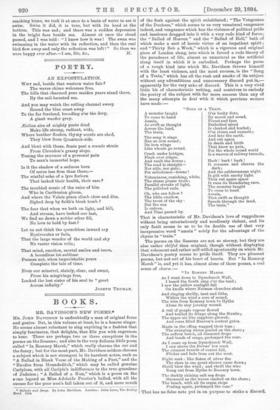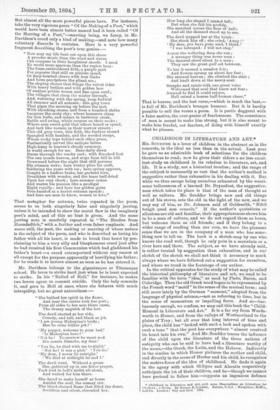BOOKS.
MR. DAVIDSON'S NEW POEMS.* Mn. Jorm DAVIDSON is undoubtedly a man of original force and genius. Bat, in this volume at least, he is a hoarse singer. He seems almost reluctant to sing anything in a fashion that simply fascinates, that delights, that fills you with eagerness to hear. There are perhaps two or three exceptions in the poems on the Seasons; and also in the very delicate little poem called "In Romney Marsh," which really charms the ear and the fancy; but for the most part, Mr. Davidson seldom chooses a subject which is not strongest in its harshest notes, such as "A Ballad in Blank Verse of the Making of a Poet," and the "Exodus from Houndsditch," which may be called genuine Carlylese, with all Carlyle's indifference to the true grandeur of Judaism ; "A Ballad of a Nun," which is a poem on the ime legend as Miss Adelaide Procter's ballad, with all the excuse for the poor nun's fall taken out of it, and mere revolt
• Ballads and Songs. By John Davidson. London : John Lane, The Bodley Head. 1854
of the flesh against the spirit substituted ; "The Vengeance of the Duchess," which seems to us very unnatural vengeance indeed, and vengeance which has the violence of political pride and insolence dragged into it with a very rude kind of force; the "Ballad of Heaven" and the "Ballad of Hell," both of which make a sort of heroic virtue of an impatient spirit ; and "Thirty Bob a Week," which is a vigorous and original piece of London slang, into which is forced a rude theory of the paradoxes of life, almost as unnatural as the artificial slang itself in which it is embodied. Perhaps the poem of a rough kind into which Mr. Davidson throws himself with the least violence, and the most success, is the "Song of a Train," which has all the rush and smoke of its subject without any adventitious and unnecessary discord put in,— apparently for the very sake of discord. This is a very vivid little bit of characteristic writing, and contrives to embody the poetry of the subject with far more success than any of the many attempts to deal with it which previous writers have made :—
A TRAIN.
O'er bosky dens, By marsh and mead, Forest and fens Embodied steed Is clanked and hurled ; O'er rivers and runnels ; And into the earth.
And out again In death and birth That know no pain, For the whole round world Is a warren of railway tunnels.
Hark ! hark ! hark !
it screams and cleaves the dark ; And the subterranean night Is gilt with smoky light.
Then out again apace It runs its thundering race, The monster taught To come to hand Amain, That swift as thought Speeds through the land, The train."
That is characteristic of Mr. Davidson's love of ruggedness without being ostentatiously and needlessly violent, and its only fault seems to us to be its double use of that very inexpressive word " amain " solely for the advantage of the rhyme to "train."
The poems on the Seasons are not so stormy, but they are also rather skiVal than original, though without displaying that vehement and rather self-willed spontaneity on which Mr. Davidson's poetry seems to pride itself. They are pleasant poems, but not out of his heart of hearts. But "In Romney
Marsh" is, and yet it has, almost alone of these poems, a real sense of charm :—
" IN ROMNEY MARSH.
As I went down to Dymchurch Wall, I heard the South sing o'er the land ; I saw the yellow sunlight fall On knolls where Norman churches stand.
And ringing shrilly, taut and lithe, Within the wind a core of sound, The wire from Romney town to Hythe
Alone its airy journey wound.
A veil of purple vapour flowed And trailed its fringe along the Straits; The upper air like sapphire glowed ; And roses filled Heaven's central gates.
Masts in the offing wagged their tops ; The swinging waves pealed on the shore ; The saffron beach, all diamond drops And beads of surge, prolonged the roar.
As I came up from Dymchurch Wall, . I saw above the Downs' low crest The crimson brands of sunset fall, Flicker and fade from out the west.
Night sank : like flakes of silver fire The stars in one great shower came down; Shrill blew the wind ; and shrill the wire Rang out from Hythe to Romney town.
The darkly shining salt sea drops Streamed as the waves clashed on the shore; The beach, with all its organ stops Pealing again, prolonged the roar."
That has no false note put in on purpose to strike a discord.
" Sou° or A monster taught To come to hand Amain, As swift as thought Across the land, The train.
The song it sings Has an iron sound ; Its iron wings Like wheels go round.
Crash under bridges, Flash over ridges, And vault the downs ; The road is straight— Nor stile, nor gate; For milestones—towns !
Voluminous, vanishing, white, The steam plume trails; Parallel streaks of light, The polished rails.
Oh, who can follow? The little swallow, The trout of the sky : But the sun Is outrun, And Time passed by. But almost an the more powerful pieces have. For instance, take the very vigorous poem "Of the Making of a Poet," which would have been almost better named had it been called "Of the Marring of a Poet,"—marring being, we fancy, in Mr. Davidson's creed only a kind of making,—and note how many voluntary discords it contains. Here is a very powerful fragment describing the poet's true genius :—
"Now may my life beat out upon this shore
A prouder music than the wind and waves Can compass in their haughtiest moods. I need No world more spacious than the region here: The foam-embroidered firth, a purple path For argosies that still on pinions speed. Or fiery-hearted cleave with iron limbs And bows precipitous the pliant sea; The sloping shores that fringe the velvet tides With heavy bullion and with golden lace Of restless pebble woven and fine spun sand ; The villages that sleep the winter through, And, wakening with the spring, keep festival All summer and all autumn: this grey town That pipes the morning up before the lark With shrieking steam, and from a hundred stalks Lacquers the sooty sky; where hammers clang On iron hulls, and cranes in harbours creak, Rattle and swing, whole cargoes on their necks ; Where men sweat gold that others hoard or spend, And lurk like vermin in their narrow streets : This old grey town, this firth, the further strand Spangled with hamlets, and the wooded steeps, Whose rocky tops behind each other press, Fantastically carved like antique helms High-hung in heaven's cloudy armoury, Is world enough for me. Here daily dawn Burns through the smoky east; with fire-shod feet The sun treads heaven, and steps from hill to hill Downward before the night that still pursues His crimson wake; here winter plies hi craft, Soldering the years with ice; here spring appears, Caught in a leafless brake, her garland torn, Breathless with wonder, and the tears half-dried Upon her rosy cheek ; here summer comes And wastes his passion like a prodigal Right royally ; and hero her golden gains Free-handed as a harlot autumn spends ; And here are men to know, women to love."
That metaphor for autumn, twice repeated in the poem, seems to us both singularly false and singularly jarring, unless it be intended to show the moral flaw in the imaginary poet's mind, and of this no hint is given. And the same jarring note is carefully repeated in "The Exodus from Houndsditch," with a further and even falser emphasis. And worse still, the poet, the making or marring of whose nature is the subject of the poem, and who is described as loving his father with all his heart, is made to break that heart by pro- claiming to him a very Billy and blasphemous creed just after he had received his first Communion which had gladdened his father's heart —a creed extemporised without any reason at all except for the purpose apparently of horrifying his father ; for he rends it to tatters almost as soon as he has uttered it Mr. Davidson belongs to the gigantesque or Tits.nesque school. He loves to strike hard just when he is least expected to strike. In his "Ballad of Hell," for instance, he makes two lovers agree to commit suicide. Only the lady commits it, and goes to Hell at once, where she behaves with much intrepidity, but no great naturalness :— " She bathed her spirit in the flame,
And near the centre took her post ; From all sides to her ears there came, The dreary anguish of the lost.
The devil started at her side, Comely, and tall, and black as jet.
I am young Malespina's bride ; Has he come hither yet ? '
'My poppet, welcome to your bed.' 'Is Malespina, here ?'
Net he ! To-morrow he must wed liis cousin Blanche, my dear.'
You lie, he died with me to-night!
Not he ! it was a plot.' 'You lie.' 'My dear, I never lie outright.' ' We died at midnight he and
The devil went, Without a groan
She, gathered up in one fierce prayer, Took root in hell's midst all alone, And waited for him there.
She dared to make herself at home Amidst the wail, the uneasy stir. The blood-stained flame that filled the dome, Scentless and silent, shrouded her.
How long she stayed r cannot tell; But when she felt his perfidy,
She marched across the floor of hell: And all the damned stood up to see.
The devil stopped her at the brink : She shook him off ; she cried, 'Away !'
'My dear, you have gone mad, I think? was betrayed: I will not stay.'
Across the weltering deep she ran ; A stranger thing was never seen : The damned stood silent to a man; They saw the great gulf set between.
To her it seemed a meadow fair; And flowers sprang up about her feet ; She entered heaven ; she climbed the stair ; And knelt down at the mercy-seat.
Seraphs and saints with one great voice Welcomed that soul that knew not fear ; Amazed to find it could rejoice,
Hell raised a hoarse half-human cheer."
That is hoarse, and the last verse,—which is much the beat,— is full of Mr. Davidson's brusque humour. But it is hardly possible to call the verses a poem. It is poetic doggerel with a false motive, the over-praise of fearlessness. The conscience of man is meant to make him strong, but it is also meant to. make him fearful, not fearless, of doing with himself exactly what he pleases.



































 Previous page
Previous page